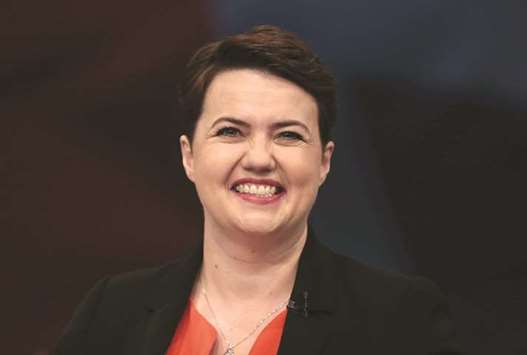The Scottish Conservative leader, Ruth Davidson, has been praised by mental health experts, campaigners and MPs for talking openly about self-harming and having suicidal thoughts as a teenager.
Davidson, who is pregnant with her first child, talked about going into “a total tailspin” after a boy she knew committed suicide. At 17 she said that she started hurting herself, punching walls, cutting her stomach and arms with blades or broken glass. When she was 18 she was diagnosed with clinical depression.
The comments were made in her memoirs, extracts of which were published in the Sunday Times. During an interview with the paper, Davidson pulled up her sleeve to reveal her scars. She also explicitly ruled out ever being leader of the Conservatives, despite frequently being tipped for the position.
Asked if she would ever run, Davidson said: “No. I value my relationship and my mental health too much for it. I will not be a candidate.”
The Scottish politician’s openness and frankness has been met with praise by psychiatrists, politicians and mental health campaigners.
Norman Lamb, the Liberal Democrat North Norfolk MP, said she was an “admirable human being”, adding that her words would help to confront the stigma around mental health problems.
He said: “It’s also a message of optimism because she has overcome challenges … That message of optimism and hope is an important one.” Alastair Campbell, the former spin doctor who is now an ambassador for Time To Change, Mind and Rethink, said that Davidson’s decision to speak about her mental health could only be a positive thing.
“The more people in public life who show that it is possible to have, or to have had mental health problems, and to take on big challenges, the better,” he said.
“I certainly don’t think that the issues Davidson has talked about would in any way bar her from seeking high office. But ultimately people have to be the best judges themselves of what levels of pressure and scrutiny they could bear and there is no doubt being prime minister means a lot of both.”
The Royal College of Psychiatrists were equally positive, with Dr Bernadka Dubicka, chair of the Royal College of Psychiatrists’ child and adolescent faculty, saying it showed anyone can be affected by mental illness. “But with the right help, people can recover and lead successful lives,” she added.
Others pointed out that mental health problems should not put people off taking on political roles. Natasha Devon, a mental health campaigner welcomed Davidson’s words but said that they could be interpreted as meaning that “if you have mental health issues you aren’t fit to lead a party.” “That’s simply not true – mental illnesses, just like their physical counterparts can be managed and with the right support they don’t render a person less capable,” she said.

Ruth Davidson: rules out running for Conservative leadership
